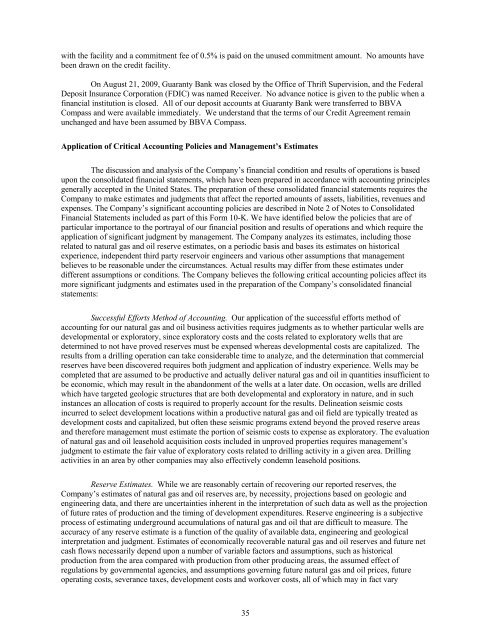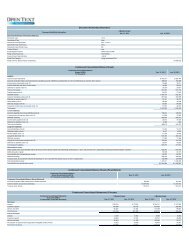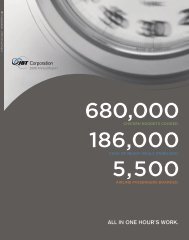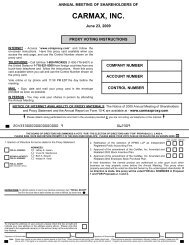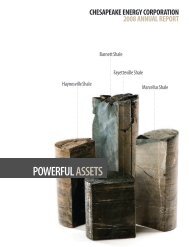FORM 10-K CONTANGO OIL & GAS COMPANY
FORM 10-K CONTANGO OIL & GAS COMPANY
FORM 10-K CONTANGO OIL & GAS COMPANY
Create successful ePaper yourself
Turn your PDF publications into a flip-book with our unique Google optimized e-Paper software.
with the facility and a commitment fee of 0.5% is paid on the unused commitment amount. No amounts have<br />
been drawn on the credit facility.<br />
On August 21, 2009, Guaranty Bank was closed by the Office of Thrift Supervision, and the Federal<br />
Deposit Insurance Corporation (FDIC) was named Receiver. No advance notice is given to the public when a<br />
financial institution is closed. All of our deposit accounts at Guaranty Bank were transferred to BBVA<br />
Compass and were available immediately. We understand that the terms of our Credit Agreement remain<br />
unchanged and have been assumed by BBVA Compass.<br />
Application of Critical Accounting Policies and Management’s Estimates<br />
The discussion and analysis of the Company’s financial condition and results of operations is based<br />
upon the consolidated financial statements, which have been prepared in accordance with accounting principles<br />
generally accepted in the United States. The preparation of these consolidated financial statements requires the<br />
Company to make estimates and judgments that affect the reported amounts of assets, liabilities, revenues and<br />
expenses. The Company’s significant accounting policies are described in Note 2 of Notes to Consolidated<br />
Financial Statements included as part of this Form <strong>10</strong>-K. We have identified below the policies that are of<br />
particular importance to the portrayal of our financial position and results of operations and which require the<br />
application of significant judgment by management. The Company analyzes its estimates, including those<br />
related to natural gas and oil reserve estimates, on a periodic basis and bases its estimates on historical<br />
experience, independent third party reservoir engineers and various other assumptions that management<br />
believes to be reasonable under the circumstances. Actual results may differ from these estimates under<br />
different assumptions or conditions. The Company believes the following critical accounting policies affect its<br />
more significant judgments and estimates used in the preparation of the Company’s consolidated financial<br />
statements:<br />
Successful Efforts Method of Accounting. Our application of the successful efforts method of<br />
accounting for our natural gas and oil business activities requires judgments as to whether particular wells are<br />
developmental or exploratory, since exploratory costs and the costs related to exploratory wells that are<br />
determined to not have proved reserves must be expensed whereas developmental costs are capitalized. The<br />
results from a drilling operation can take considerable time to analyze, and the determination that commercial<br />
reserves have been discovered requires both judgment and application of industry experience. Wells may be<br />
completed that are assumed to be productive and actually deliver natural gas and oil in quantities insufficient to<br />
be economic, which may result in the abandonment of the wells at a later date. On occasion, wells are drilled<br />
which have targeted geologic structures that are both developmental and exploratory in nature, and in such<br />
instances an allocation of costs is required to properly account for the results. Delineation seismic costs<br />
incurred to select development locations within a productive natural gas and oil field are typically treated as<br />
development costs and capitalized, but often these seismic programs extend beyond the proved reserve areas<br />
and therefore management must estimate the portion of seismic costs to expense as exploratory. The evaluation<br />
of natural gas and oil leasehold acquisition costs included in unproved properties requires management’s<br />
judgment to estimate the fair value of exploratory costs related to drilling activity in a given area. Drilling<br />
activities in an area by other companies may also effectively condemn leasehold positions.<br />
Reserve Estimates. While we are reasonably certain of recovering our reported reserves, the<br />
Company’s estimates of natural gas and oil reserves are, by necessity, projections based on geologic and<br />
engineering data, and there are uncertainties inherent in the interpretation of such data as well as the projection<br />
of future rates of production and the timing of development expenditures. Reserve engineering is a subjective<br />
process of estimating underground accumulations of natural gas and oil that are difficult to measure. The<br />
accuracy of any reserve estimate is a function of the quality of available data, engineering and geological<br />
interpretation and judgment. Estimates of economically recoverable natural gas and oil reserves and future net<br />
cash flows necessarily depend upon a number of variable factors and assumptions, such as historical<br />
production from the area compared with production from other producing areas, the assumed effect of<br />
regulations by governmental agencies, and assumptions governing future natural gas and oil prices, future<br />
operating costs, severance taxes, development costs and workover costs, all of which may in fact vary<br />
35


